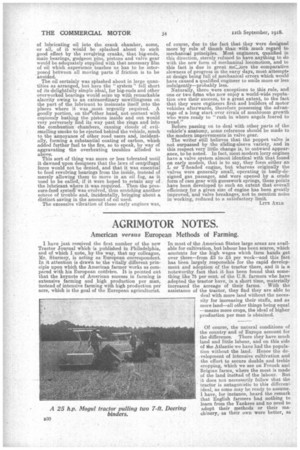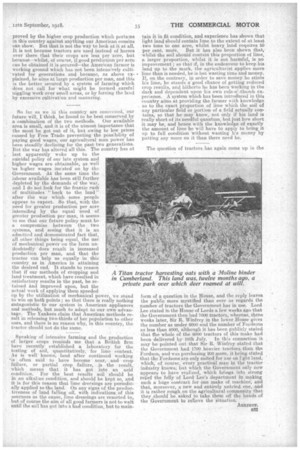AGRIMOTOR NOTES.
Page 10

Page 11

If you've noticed an error in this article please click here to report it so we can fix it.
American versus European Methods of Farming.
I have just received the first number of the new Tractor Journal which is published in Philadelphia, and of which I note, by the way, that my colleague, Mr. Sturmey, is acting as European correspondent. In it attention is drawn to the vitally different principle upon which the American farmer works as compared with his European confrere. It is pointed out that the keynote of American success in farming is extensive farming and .high production per man, instead of intensive farming with high production per acre, which is the goal of the European agriculturist.
In most of the American States large areas are available for cultivation, but labour has been scarce, which accounts for the high wages which farm hands get over there—from £3 to £5 per week—and this fact has been largely responsible for the rapid development and adoption of the tractor there, and it is a noteworthy fact that it has been found that something like 75 per cent, of the U.S. farmers who have adopted the tractor have, in a short time, materially increased the acreage of their farms. With the assistance of the tractor, they find they are able to deal with more land without the neces
sity for increasing their staffs, and as more land—all other things being equal —means more crops, the ideal of higher production per man is obtained.
Of course, the natural conditions of the country and of Europe account for the difference. There they have much land and little labour, and on this side • of the Atlantic we have had the population without the land. Hence the development of intensive cultivation and the effort to secure double and treble cropping, which we see on French and
• Belgian farms, where the most is made of the land inathad of the labour. But it does not necessarily follow that the tractor is antagonistic to this different ideal, as some may be ready to assume. I have, for instance, heard the remark that English farmers had nothing to learn from the Yankees and no need to adopt their methods or their machinery, as their own were better, as
proved by the higher crop production which pertains in this country against anything our American cousins can show. But that is not the way to look at it at all. It is not because tractors are used instead of horses over there that their crops are less per acre, but because—whilst, of course, if good production per acre can be obtained it is secured—the American farmer is working ground which has not been intensively cultivated for generations and because, as above explained,. he aims at large production per man, and this is the better secured by a system of farming which does not call for what might be termed carefnl niggling work over small areas, or by forcing the land by excessive cultivation and manuring.
So far as we hi this country are concerned, • our future will I think, be found to be best conserved by a .combination of the two methods. Our available area is small, and it is of the utmost importance that the most be got out of it, but owing to low prices caused by Free Trade preventing the possibility of
paying good wages, our agricultural man power has been steadily declining for the Past two generations. But the war has altered all this. The country has at last apparently woke up to the suicidal policy of our late system and higher wages are obtainable, as well 'as higher wages insIstedon by the Government. At the same time the labour available has been still further depleted by the demands of the war, and I do not, look for the frantic rush of multitudes " back to the land" after the war which some people appear to expect. So that, with the need for greater production per acre intensified by the equal need of greater production per man, it seems o me that our future policy must be a compromise between the two systems, and seeing that it is an admit [NI and demonstrated fact that, all other things being equal, the use of mechanical power on the farm undoubtedly does result in increased production per man, and that the tractor can help us equally in this country as in America in attaining the desired end. It stands. to reason that if our methods of cropping and land treatment, which have resulted in satisfactory results in the past, be retained and improved upon, but the actual work of applying them speeded Up by the utilization of mechanical power, we stand to win on both points ; so that there is really nothing antagonistic to our system in American a-ppliances and methods, but much to adapt to our own advantage. The -Yankees claim that American methods result in releasing two-thirds of her population to other uses, and there is no reason why, in this country, the tractor should not do the 'same.
Speaking of intensive farming and the .production of larger crops reminds me that a British firm have recently established a laboratory for the testing of soil, quantitatively, for lime content. As is well known, land after continued working -isoften said to have become sour, and crop failure, or partial crop failure, is the result,, which means that it has got into an acid condition. For the best results soil should be in an alkaline condition, and should be kept so. and it is for this reason that lime dressings are periodically applied to the land. On any signs of the productiveness of land falling off, with indications, of this sourness as the cause, lime dressings are resorted to, but of course the aim of all good farmers is not to wait until the soil has get into a bad condition, but to main
tam n it in fit condition, and experience has shown that light land should contain lime to the extent of at least two tons to one acre, whilst heavy land requires. 60 per cent. more. But it has also been shown that, whilst the soil should contain this proportion of lime, a larger proportion, whilst it is not harmful, is no improvement ; so that if in the endeavour to keep his land up to the mark, the agriculturist applies more
• lime than is needed, he is but wasting time and money. If, on the contrary, in order to save money he stints Ws lime, he stands a good chance of getting reduced crop results, and hitherto he has been working in the dark and dependent upon his own rule-o',-thumb experience. A system which has been introduced in this country aims at providing the farmer with knowledge as to the exact proportion of lime which the soil of any particular field or portion of a field actually contains, so that he may know, not only if his land is really short of its heedful quantum, but just how short it may be, and hence with the knowledge of exactly the amount of lime he will have to apply to bring it up to full condition without wasting h7s money by putting any more on it than there need be.
form of a question in the House, and the reply leaves the public more mystified than ever as regards the number of tractors the Government has in use. Lord Lee stated in the House of Lords a few weeks ego that the Government then had 7000 tractors, whereas, three weeks later, Sir R. Winfrey in the lower House gives the number as under 6000 and the number of Fordsone as less than 4000, although it has been publicly stated that the whole, of the 6000 tra.Ctors Of this Make had been delivered by 18th July. In this connection it may be pointed out that Sir R. Winfrey stated that the Government had 1700 heavier tractors. than the Fordson' and was purchasing 200 more, it being stated that the Fordsons are only suited for use on lightland, which, of course, every practical man in the tractor industry knows; but which the Goverimiciit only now appears to have realized, which brings into strong relief the folly of Lord Lee's -department in .making such a huge 'contract for One make of. machine, and that, moreover, a new and entirely untried one, and it is rather rough on the agricultural community that they .Should be. asked to take them oif the hands of the Government to relieve the situation.
AGE MOT. B3I






















